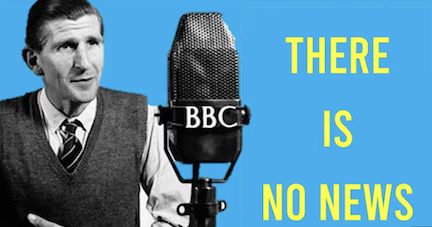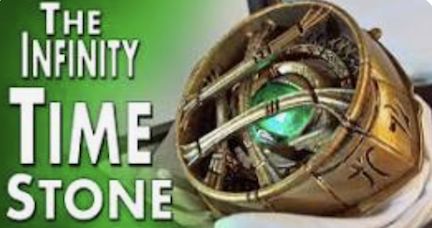"When There Is No News" God's Presence Is Constant
On April 18, 1930, the BBC announced, “There is no news.”
On April 18, 1930, nothing at all newsworthy occurred — at least according to the BBC. At the start of its regular news broadcast at 8:45 p.m., the BBC announced, “Good evening. Today is Good Friday. There is no news.” This unexpected declaration was followed by 15 minutes of piano music, before the radio station resumed its broadcast of Wagner’s opera Parsifal.

In our fast-paced, information-saturated world, it might be hard to imagine a day when literally nothing made the news. But even on that date so long ago, the stunning announcement, “There is no news,” took everyone by surprise.
Now, think about that for a moment. An entire global news agency, tasked with informing the public, had nothing to report. No headlines. No drama. No crisis. Just ... silence and a little music.
That moment reminds me a lot of the seasons in our spiritual lives when it seems like nothing is happening. We read our Bibles, we pray, we go to church—but we don’t feel goosebumps or hear God speak loudly. It’s tempting to think, “God must not be doing anything in my life right now.”
But friends, silence doesn’t mean absence! Just because the headlines of our lives feel quiet doesn't mean God isn't at work behind the scenes. Some of God’s greatest work is done in the stillness.
Psalm 46:10 says, "Be still, and know that I am God."
It doesn’t say, “Be busy,” or “Make some noise.” It says, “Be still.”
In those quiet seasons, God is still sovereign. He’s still shaping you, preparing you, guiding you—even when there’s “no news.”
So the next time your life feels silent, and heaven seems quiet, remember: Just because you don’t see it or hear it, it doesn’t mean God isn’t doing something powerful.
"For God alone, O my soul, wait in silence, for my hope is from him" (Psalms 62:5, ESV).
Trusting God with Time
We all want to be Dr. Strange.
In the Marvel Cinematic Universe, there are six infinity stones. They are a group of cosmic gems that grant their owner great power. One of these six stones is the Time Stone.

The time stone grants its owner the power to rewind and fast-forward time. Dr. Strange discovered the stone in his origin movie, using it to trap the villain Dormammu in a time loop so that Dormammmu couldn't destroy earth. Then, he wears the stone throughout Infinity War.
But Thanos, a powerful, purple humonoid with superhuman strength and power, "used the Infinity Stones to 'snap' his fingers, which resulted in the instantaneous destruction of half of all life in the universe, effectively wiping out half of all living beings across the cosmos."
As the good guys are fighting the villain Thanos and his army, Dr. Strange tells Iron Man that if he has to choose between giving up the stone and saving the lives of the Avengers, he’ll prioritize the stone. Yet, later in Infinity War, he uses the power of the Time Stone to look into the many possible futures that could play out. He gleans from this knowledge that he will have to give up the stone to Thanos in order for the Avengers to eventually defeat him.
Like Dr. Strange, who wouldn't want to control time? In a way, by controlling time, you could effectively control everything else, because you could leap from from past to present, righting wrongs or forseeing future disasters and averting them.
Yet it is only as we give up trying to control everything, as Dr. Strange gave up the power of the Time Stone to save the universe, that we’ll find a release of freedom to simply trust God and enjoy life here in the present.
As Psalm 90:12 says, "Teach us to number our days, that we may gain a heart of wisdom" (NIV).
And as the Lord Himself said, "Therefore do not worry about tomorrow, for tomorrow will worry about itself. Each day has enough trouble of its own" (Matthew 6:34, NIV).
A Muscle-Bound God?
One of the debates in athletics, especially in boxing, is how much muscle is too much. It is suggested that when a fighter becomes too muscle-bound, their flexibility, quickness, and endurance are all compromised.
In a theological equivalent, some have suggested that there are certain ways that God is limited due to His sovereignty. When you are as sovereign as God, it is argued, you can’t allow others to have genuine free will or allow life to just play out. God is just too sovereign (muscle-bound) to allow such things. But is God really limited by the prodigiousness of His own capabilities? Are His capacities so great that they become self-limiting?

Following this logic, how does God allow anything to exist outside of Himself? Since God is omniscient, does that mean that He can’t allow ignorance to exist? Since God is omnipresent, does that mean that nothing else can fill any part of the same space? Since God is omnipotent, does that mean that only He can wield power? Of course, all of these things are allowed to exist outside of the personhood of God.
Despite this, it is argued that because God is sovereign, He can’t create mankind to have free will. This point of view turns God’s unlimited ability into a limitation, which is contradictory. Isn’t it better to understand that God exercises complete control over His unlimited capacities? Isn’t it more consistent to believe that there is no good thing that God can’t do?
This certainly finds support in the Scriptures which acknowledge both the unlimited nature of God’s divine attributes, as well as the reality of man’s free will.
“Ah, Sovereign LORD, you have made the heavens and the earth by your great power and outstretched arm. Nothing is too hard for you" (Jeremiah 32:17, NIV).